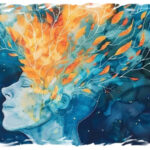The mind and the body are intricately connected, and both play a crucial role in our overall well-being. However, many philosophers, scientists, and spiritual leaders have argued that the mind is more significant than the body.
One of the most fundamental ways in which the mind is larger than the body is its ability to transcend the physical limitations of the body. The mind has the ability to think, imagine, and create, which allows us to envision and pursue possibilities beyond the boundaries of our physical reality. It also allows us to experience emotions, ideas, and concepts that are not limited by our physical form.
Another way in which the mind is larger than the body is its ability to transcend time. Our memories, thoughts, and experiences are stored in mind and can be accessed and revisited, even after the body is gone. This allows us to learn from the past, plan for the future, and appreciate the present moment.
The mind can also transcend space, allowing us to communicate with others and share ideas, regardless of physical location. The internet and technology have made this even more possible, allowing us to instantly connect with people worldwide.
The mind also can surpass the self, allowing us to empathise and understand the perspectives of others. This will enable us to develop a sense of compassion and connection with others, which is essential for building a harmonious and fulfilling life.
Moreover, the mind has the ability to transcend physical boundaries and limitations through the power of imagination and visualisation. Through visualisation, we can see ourselves achieving our goals and dreams, which helps us to believe that it is possible and take the necessary steps to make it happen.
The mind has the ability to transcend the physical limitations of the body, time, space, self and even reality through imagination and visualisation. It allows us to explore new possibilities, connect with others, and create a more meaningful and fulfilling life.
It’s essential to take care of both the mind and the body and understand that they are intimately connected, and one can’t function without the other.
The mind-body connection is a well-established concept in the field of medicine, and research has shown that the mind plays a crucial role in the healing process of diseases. The mind can influence the body’s functioning and can affect the progression and outcome of illnesses.
One of the most potent ways the mind can influence the body is through the placebo effect. The placebo effect refers to the phenomenon where a person’s symptoms can improve after treatment with no active therapeutic properties. This is because the person’s belief in the effectiveness of the treatment can trigger a cascade of physiological changes in the body that can lead to symptom improvement.
The power of the mind is also evident in the field of psychoneuroimmunology, which studies the relationship between the mind, the nervous system, and the immune system. Research has shown that the mind can influence the immune system by releasing immune-modulating chemicals, such as cytokines, that can affect the body’s ability to fight off infections and illnesses.
Another critical aspect of the mind-body connection is the role of stress in the healing process. Stress has been shown to have a negative impact on the body’s ability to heal. Chronic stress can suppress the immune system, increase inflammation, and lead to chronic diseases. On the other hand, relaxation techniques such as meditation and yoga have been shown to positively impact the healing process by reducing stress and promoting relaxation.
The mind also plays a crucial role in the healing process through psychological therapies. Cognitive Behavioral Therapy (CBT) and other forms of psychotherapy can help to change negative thought patterns and beliefs that can affect the body’s ability to heal.
In conclusion, the mind plays a crucial role in the healing process of diseases. The mind-body connection is a powerful tool that can be utilised to promote healing and improve the outcome of illnesses. By understanding the role of the mind in the healing process and employing techniques such as relaxation, psychological therapies, and the placebo effect, individuals can take an active role in their own healing journey.



